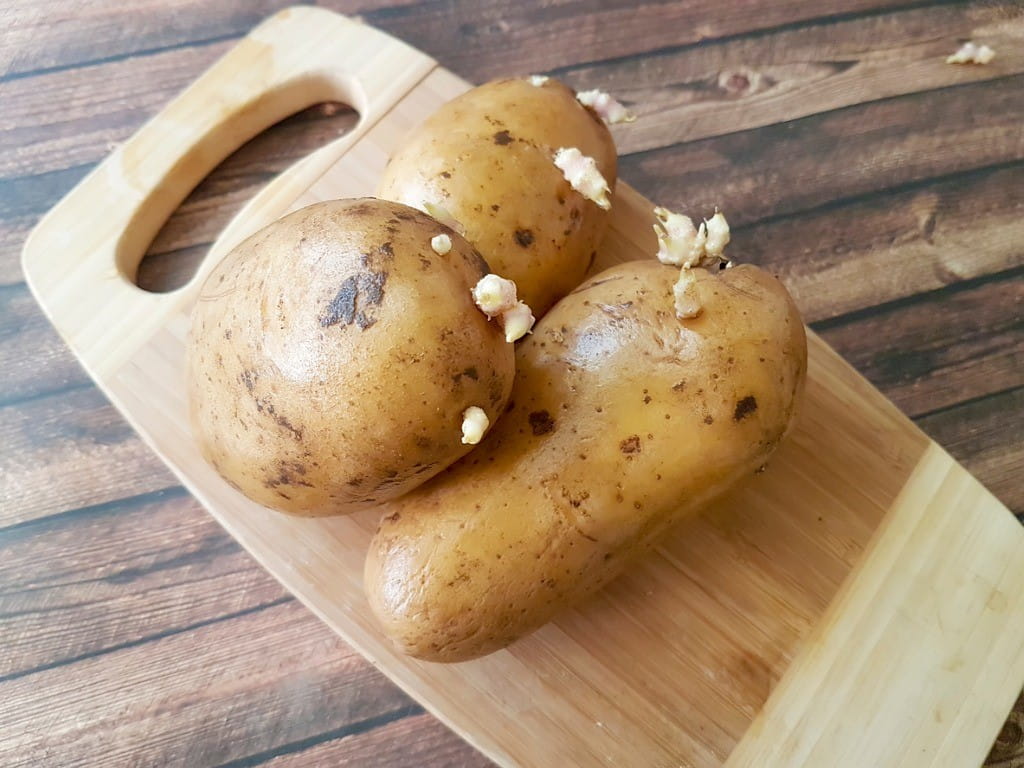Are Sprouted Potatoes Safe to Eat?

The Bottom Line
You are better off tossing potatoes that have turned green or grown sprouts. Eating them puts you at risk for toxicity from solanine and chaconine, 2 natural toxins found in green or sprouted potatoes.

Why do potatoes turn green and sprout?
Potatoes turn green and sprout because they are trying to do what nature intended—make new potato plants. Cutting up and planting chunks of sprouted potatoes in the ground is how farmers plant their next crop.Are sprouted potatoes safe to eat?
Potatoes contain two toxic glycoalkaloids called solanine and chaconine. However, fresh potatoes that have not sprouted contain only small amounts of glycoalkaloids at concentrations that are safe for consumption. Exposure to light greatly increases the formation of chlorophyll and glycoalkaloids. Chlorophyll is responsible for the green color of many plants and is not toxic. However, the green color of the increased chlorophyll might indicate that there is an excess of glycoalkaloids in a potato.All parts of the potato plant contains glycoalkaloids. The highest concentrations are found in the leaves, flowers, "eyes," green skin, and sprouts. The lowest concentration is in the white body of the potato. The formation of glycoalkaloids in potatoes is increased by warm storage temperatures and exposure to light. Cooking potatoes by baking, boiling, frying, and microwaving does not eliminate glycoalkaloids. However, removing the potato’s skin before cooking can reduce the glycoalkaloid content.
What are symptoms of solanine and chaconine toxicity?
Solanine and chaconine can cause gastrointestinal symptoms such as vomiting, abdominal pain, and diarrhea. Some people might also experience headaches, flushing, confusion, and fever. There have been a few cases of death from eating toxic potatoes. The onset of symptoms typically occurs within a few hours, but can be delayed as long as a day.What’s the best way to store potatoes?
You can minimize glycoalkaloid toxicity by only buying potatoes as you need them and storing them in a cool, dry place. They should be in a breathable container so air can circulate around them. Do not store potatoes in sealed containers, and do not store them with onions, as gases emitted from onions can speed up potato sprouting. The same advice for avoiding any type of foodborne illness applies to potatoes: when in doubt, throw them out.Is it safe to eat raw potatoes?
Uncooked potatoes contain lectins, a type of protein that can be harmful, but taking a bite or two from the white part of a potato is unlikely to do harm. Lectins can cause nausea, vomiting, stomach upset, and diarrhea if eaten in large amounts. Raw potatoes also contain some types of starch that are hard to digest and that can cause gas and bloating. Unless the potato has been peeled and thoroughly washed, there is a chance that harmful bacteria from the surface of the potato could still be present.I ate a bad potato. What should I do?
Most people with mild symptoms can remain at home. If symptoms are severe and persistent, or if you are unable to hold down fluids, medical attention might be needed.If you believe you ate a bad potato or have questions about food safety, help from experts is available through the webPOISONCONTROL online tool and by phone at 1-800-222-1222. Poison Control’s expert guidance is always free, confidential, and available 24 hours a day.
Diana M. Pei, PharmD
Certified Specialist in Poison Information
Revised William G. Troutman, PharmD
Professor of Pharmacy Emeritus
Poison Control Media Information
Did you find this page helpful? If so, we need your support. Poison Control is in constant competition with misinformation online. Links to www.poison.org or our webPOISONCONTROL triage tool from other websites and blogs help internet searchers quickly find accurate information and Poison Control’s contact information in an emergency. If you use the content from this page, please provide attribution via a link back to this page, www.poison.org, or https://triage.webpoisoncontrol.org/#!/exclusions. By doing so, you could save a life. Thank you!
Poisoned?
Call 1-800-222-1222 or
Prevention Tips
- Buy potatoes shortly before you need them.
- Inspect potatoes, looking for sprouts and green peels.
- Store potatoes in a cool, dark place.
- Remove potato skins before eating.
- If in doubt, throw them out.
This Really Happened
Case 1. A husband and wife had green potatoes for breakfast. Three hours later, the wife had diarrhea and nausea, while the husband remained fine. She was able to stay at home and stay hydrated. Eight hours after breakfast, the wife started to feel better.
Case 2. A 42-year-old man arrived at an emergency room after eating potatoes with sprouts on them. He had nausea, vomiting, and dizziness. He was given intravenous fluids, anti-vomiting medication, and an anti-anxiety medication. He was admitted to the hospital for further monitoring and care. He was discharged after 3 days.
For More Information
References
Camire ME, Kubow S, Donnelly DJ. Potatoes and human health. Crit Rev Food Sci Nutr. 2009;49(10):823-840.
David L. Is it safe to eat raw potatoes? Here’s what the experts say. Simplyrecipies. June 16, 2023. Accessed April 14, 2024.
Furrer AN, Chegeni M, Ferruzzi MG. Impact of potato processing on nutrients, phytochemicals, and human health. Crit Rev Food Sci Nutr. 2018;58(1):146-168.
Harvard T.H. Chan School of Public Health. Lectins. Reviewed January 2022. Accessed April 23, 2024.
Knuthsen P, Jensen U, Schmidt B, Larsen IK. Glycoalkaloids in potatoes: content of glycoalkaloids in potatoes for consumption. J Food Comp Analysis. 2009;22(6):577-581.
Mensinga TT, Sips AJ, Rompelberg CJ, et al. Potato glycoalkaloids and adverse effects in humans: an ascending dose study. Regul Toxicol Pharmacol. 2005;41(1):66-72.
Smith KA. Horrific tales of potatoes that caused mass sickness and even death. Smithsonian. October 21, 2013. Accessed April 12, 2024.
Tian J, Chen J, Ye X, Chen S. Health benefits of the potato affected by domestic cooking: a review. Food Chem. 2016;202:165-175.
Zaheer K, Akhtar MH. Potato production, usage, and nutrition--a review. Crit Rev Food Sci Nutr. 2016;56(5):711-721.
Poisoned?
Call 1-800-222-1222 or
Prevention Tips
- Buy potatoes shortly before you need them.
- Inspect potatoes, looking for sprouts and green peels.
- Store potatoes in a cool, dark place.
- Remove potato skins before eating.
- If in doubt, throw them out.
This Really Happened
Case 1. A husband and wife had green potatoes for breakfast. Three hours later, the wife had diarrhea and nausea, while the husband remained fine. She was able to stay at home and stay hydrated. Eight hours after breakfast, the wife started to feel better.
Case 2. A 42-year-old man arrived at an emergency room after eating potatoes with sprouts on them. He had nausea, vomiting, and dizziness. He was given intravenous fluids, anti-vomiting medication, and an anti-anxiety medication. He was admitted to the hospital for further monitoring and care. He was discharged after 3 days.
